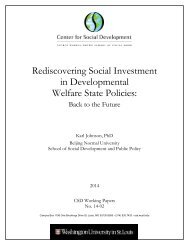Exploring and Assessing Intercultural Competence - Center for ...
Exploring and Assessing Intercultural Competence - Center for ...
Exploring and Assessing Intercultural Competence - Center for ...
Create successful ePaper yourself
Turn your PDF publications into a flip-book with our unique Google optimized e-Paper software.
<strong>Exploring</strong> <strong>and</strong> <strong>Assessing</strong> <strong>Intercultural</strong> <strong>Competence</strong><br />
Stage 1. Refine Research Concepts, Methods, <strong>and</strong> Tools (Summer 2005)<br />
- update research of literature on related research ef<strong>for</strong>ts<br />
- collect <strong>and</strong> analyze research instruments (existing <strong>and</strong> new ones)<br />
- interview civic service alumni <strong>for</strong> additional input to the concept <strong>and</strong> tool<br />
- use above in<strong>for</strong>mation (plus guidance of psychometric consultant) to finalize the pilot<br />
research plan <strong>and</strong> tool<br />
- transmit the tool to collaborating MOs <strong>for</strong> translation<br />
Stage 2. Pilot Test: The Survey (Fall 2005)<br />
- orient MO research assistants (RAs) to the tool <strong>and</strong> its use<br />
- Ecuadorian RA administers the tool pre-, mid-, <strong>and</strong> end of program, <strong>and</strong> collects<br />
results<br />
- British <strong>and</strong> Swiss RAs administer survey <strong>and</strong> interview selected respondents<br />
Stage 3. Data Compilation <strong>and</strong> Initial Analysis (Winter-Spring 2006)<br />
- RAs compile quantitative <strong>and</strong> qualitative data at national levels<br />
- RAs follow guidelines to per<strong>for</strong>m initial analysis<br />
- RAs translate data <strong>and</strong> results into English <strong>and</strong> transmit to project director<br />
Stage 4. Further Data Compilation <strong>and</strong> Analysis (Summer-Fall 2006)<br />
- review analysis subsets <strong>and</strong> list findings<br />
- compile international data <strong>and</strong> list findings<br />
- analyze data <strong>and</strong> summarize in a final report<br />
Stage 5. Initial Dissemination <strong>and</strong> Refine Assessment Tool (Winter 2006-7)<br />
4. FEIL’s Service Programs<br />
Various Experiment MOs have sponsored service programs <strong>for</strong> many years; however, the entire<br />
Federation committed to global service only within the past few years. The result is that all<br />
service projects are now coordinated under FEIL’s VIP (Volunteers <strong>for</strong> International<br />
Partnerships) umbrella. The Federation website provides general in<strong>for</strong>mation about VIP’s<br />
worldwide offerings. Individuals accessing the website are greeted with the words: “Willing<br />
People – Meaningful Work / Serving the World Community.” In<strong>for</strong>mation is then given about<br />
sending <strong>and</strong> receiving countries, service projects, inquiry <strong>for</strong>ms, a field album, <strong>and</strong> news.<br />
Individual country projects are also listed, followed by a menu of various service projects, host<br />
organizations, program components, photographs, finances, <strong>and</strong> country in<strong>for</strong>mation. (See:<br />
)<br />
In this way, interested individuals anywhere in the world can pursue volunteer service<br />
opportunities in areas of education, health, <strong>and</strong> human service, plus a variety of development<br />
projects in 14 countries, with new options being developed. Applicants outside the FEIL network<br />
are automatically referred to MOs that are geographically, linguistically <strong>and</strong>/or culturally close to<br />
their own. Applicants are matched with projects according to their skills, interests, talents, <strong>and</strong><br />
desired length of service (from one to twelve months).<br />
Several characteristics distinguish FEIL’s VIP offering: Participants undergo ongoing predeparture<br />
<strong>and</strong> in-country intercultural orientation <strong>and</strong> language study, they participate in a<br />
homestay, <strong>and</strong> they are supervised. Local supervisor-mentors provide logistical, technical, <strong>and</strong><br />
<strong>Center</strong> <strong>for</strong> Social Development<br />
Washington University in St. Louis<br />
12
















